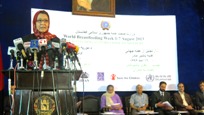 Minister of Public Health of Afghanistan, Dr Suraya Dalil, gives an inaugural speech on the occasion of World Breastfeeding WeekFrom 1 to 7 August 2013 World Breastfeeding Week was celebrated in Afghanistan and globally under the slogan of “Breastfeeding support: Close to mothers “, recognizing the importance of breastfeeding as fundamental to the health and development of infants, and equally important for the health of mothers.
Minister of Public Health of Afghanistan, Dr Suraya Dalil, gives an inaugural speech on the occasion of World Breastfeeding WeekFrom 1 to 7 August 2013 World Breastfeeding Week was celebrated in Afghanistan and globally under the slogan of “Breastfeeding support: Close to mothers “, recognizing the importance of breastfeeding as fundamental to the health and development of infants, and equally important for the health of mothers.
This year, focus is on helping mothers to establish and sustain breastfeeding and receive counselling and community support. The Peer Counselling Programme is a cost-effective and highly efficient method of reaching a larger number of mothers more frequently. Peer counsellors can be anyone from the community who is trained to support mothers.
HE Dr Suraya Dalil, Minister of Public Health of Afghanistan, in her inaugural speech said that breastfeeding contributed to achieving each of the Millennium Development Goals.
Breastfeeding has a big impact on the future well-being of our society by reducing undernutrition among children, increasing equity by ensuring an equal start for children regardless of family income and empowering women by enabling them to control their reproductive lives. She stressed the importance of ensuring a supportive environment for mothers and providing maternity leave for working mothers. She also highlighted the importance of the role in the media in the promotion of breastfeeding.
Placing infants immediately after birth for skin-to-skin contact and having exclusive breastfeeding until six months and beyond having a mixed diet with proper complementary feeding for up to two years or more will result in the reduction of under-five mortality rate by 13%–20% worldwide. The risk of postpartum haemorrhage is also reduced by early initiation of breastfeeding and protects against anaemia and maternal iron depletion due to lactational amenorrhea, and reduces the risk of breast and ovarian cancers, and diabetes.


